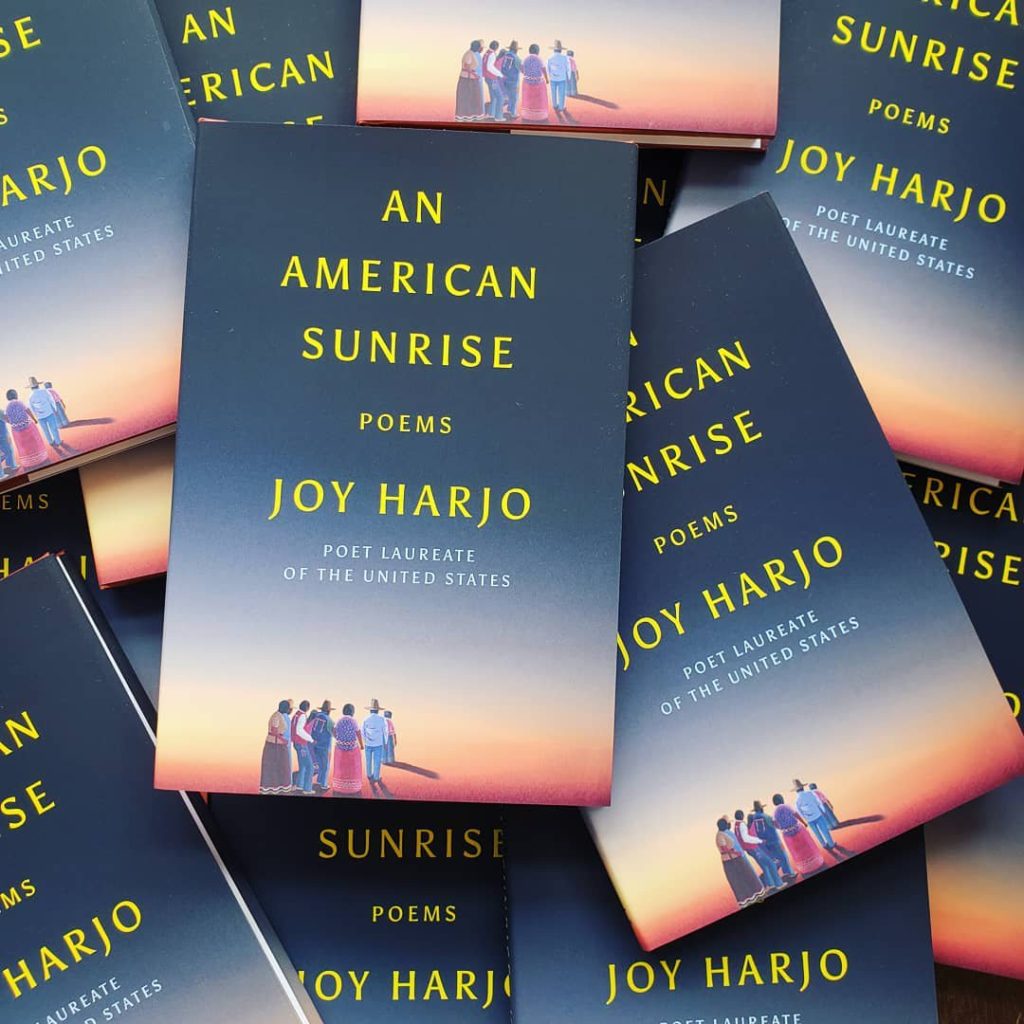Another month, another bit of rule-bending.
Over the summer, I listened to All Things Considered’s portrait of the newly appointed U.S. Poet Laureate, Joy Harjo, the first Native American to ever hold the position. And, last month, the arrival of her first book of poetry as Poet Laureate returned her to the spotlight.
Interestingly, many people looked at the appointment of Harjo with some skepticism, believing that her appointment was some sort of political apology, a gesture of friendliness to the Native American community by the otherwise antagonistic Trump administration. However, the poet laureate is appointed by the Library of Congress, and whatever residual confusion may have remained after her appointment, Harjo has cleared up in her newest book, An American Sunrise.
The book opens with a prologue that clearly states Harjo’s intentions as poet laureate:
“We were rounded up with what we could carry. We were forced to leave behind houses, printing presses, stores, cattle, schools, pianos, ceremonial grounds, tribal towns, churches. We witnessed immigrants walking into our homes with their guns, Bibles, household goods and families, taking what had been ours, as we were surrounded by soldiers and driven away like livestock at gunpoint.
There were many trails of tears of tribal nations all over North America of indigenous peoples who were forcibly removed from their homelands by government forces.
The indigenous people who are making their way up from the southern hemisphere are a continuation of the Trail of Tears.
May we all find the way home.”
An American Sunrise
Joy Harjo is a Native American poet, writer, and musician and a member of the Muscogee Creek Nation. She has published eight books of poetry as well as one memoir and was named 2019’s U.S. Poet Laureate. Additionally, Harjo performs extensively, both in the musical sphere, where she has produced four award-winning albums, and theatrically, where she performs her own one-woman plays. She is currently working to complete an upcoming musical play, We Were There When Jazz Was Invented.
You’ll note, of course, that choosing Harjo for this month’s book doesn’t necessarily align with my “immigrant women of color” theme that I’ve chosen for the year, but I felt that Harjo deftly points out the flaw in my own effort to diversify my reading—mistakenly, I have aligned people of color with immigrants. And I have done this without thinking of myself as the descendant of immigrants who forcefully stole land and goods and lives from the people already living in the place I now call my home, extending to myself the privilege of claiming something that is not mine to claim.
This point was particularly solidified for me in Harjo’s poem, “In 1990 a congress,” where she discusses a meeting held between Tribal people from all of America in response to the Columbian Quincentenary, “a celebration by immigrant populations of the arrival of Christopher Columbus to the western hemisphere on his financed expedition to find a trade route to India.” A member of the Tribal community from Bolivia asked the delegates attending from the United States,
“‘[Why] do you call yourselves America? This hemisphere is one body, one person. She is America.’”
Given the subject of my previous book/post, this poem hit me hard. I have cultivated a mindset of openness toward immigrants and am critical of our treatment of immigrants at the border, but I have done so with the privileged assumption that I am welcoming another person to my own home and that it is even my welcome to give. Moreover, Harjo points out that the indigenous people traveling from these countries belong to America in a way that I do not. Though they may be immigrants to the United States, to America, they are simply citizens and I am the immigrant.
Perhaps that’s why we, as a country, are still so afraid of the people on the border. Last week, I posited that we were not simply afraid of them, but that we refuse to hear their voices because they are “the other.” Perhaps though, we are afraid. We are afraid because, as Harjo’s prologue states, immigrants came with guns and religion and soldiers and stole everything. Perhaps we are afraid, not simply because we think such a terrible reality is possible, but because we know it is possible. We know it is possible, because it is the reality we ourselves embody.


Comments are closed.